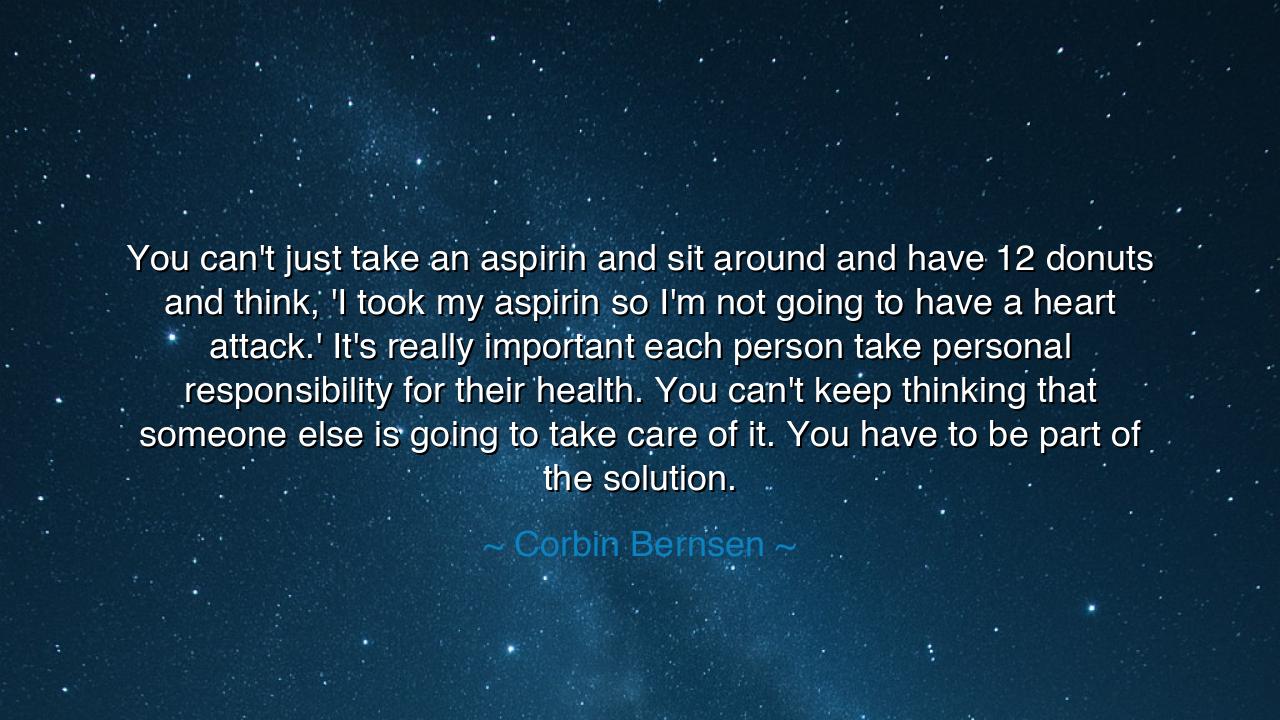
You can't just take an aspirin and sit around and have 12 donuts
You can't just take an aspirin and sit around and have 12 donuts and think, 'I took my aspirin so I'm not going to have a heart attack.' It's really important each person take personal responsibility for their health. You can't keep thinking that someone else is going to take care of it. You have to be part of the solution.






“You can't just take an aspirin and sit around and have 12 donuts and think, 'I took my aspirin so I'm not going to have a heart attack.' It's really important each person take personal responsibility for their health. You can't keep thinking that someone else is going to take care of it. You have to be part of the solution.” — Corbin Bernsen
Hear these words of Corbin Bernsen, and know that they are not merely about the body, but about the soul and the nature of responsibility itself. He speaks in the language of health, yet the truth he unveils belongs to every realm of human endeavor. For in an age of convenience, many seek salvation without sacrifice, healing without effort, wisdom without discipline. They swallow the aspirin and ignore the illness within; they hope that others — doctors, governments, or fate itself — will preserve them from the fruits of their own neglect. But the universe is not fooled by pretense. As Bernsen declares, each soul must be part of the solution — for no one can walk the path of wellness in your stead.
In ancient times, the philosophers taught that man is both guardian and enemy of his own temple. The body, they said, is sacred, a vessel lent by the heavens to carry the flame of spirit. To neglect it is to dishonor that divine trust. Yet modern man, with his medicines and machines, forgets the simple law of balance. He consumes recklessly, sleeps too little, works too long, and prays that a single pill or promise will undo years of imbalance. The aspirin and the donuts become symbols of a greater blindness — the illusion that ease can replace effort, and that responsibility can be handed to another like a burden too heavy to bear.
Remember the tale of Heracles, who was tasked to cleanse the Augean stables — a feat thought impossible. Many would have sought help, or begged the gods to intervene. But Heracles did not wait for another to act. With wisdom and resolve, he changed the course of a river, letting its waters wash away the filth. So too must we redirect the rivers of our own lives. Health, both of body and spirit, is not restored by single acts of remedy, but by a redirection of purpose — a steady flow of daily choices that cleanse the temple of the self.
When Bernsen says, “You can’t keep thinking someone else is going to take care of it,” he reminds us that dependence is the first chain of decay. The healer may guide you, but cannot live your discipline. The teacher may enlighten you, but cannot walk your road. Even the divine grants strength, not exemption. Each must rise each morning and tend to their own being — in food, in thought, in spirit. For health is not the absence of disease; it is the harmony between one’s choices and one’s nature.
There once lived a physician in ancient China who was paid not to heal, but to keep his patients healthy. When one fell ill, he was shamed, for it meant he had failed to guide them rightly. His wisdom lay not in medicine, but in prevention — in teaching his people to listen to their bodies, to nourish their hearts, and to live in rhythm with the seasons. Such was true mastery: not to cure, but to empower. This, too, is Bernsen’s call — not for blind faith in pills and remedies, but for personal vigilance, the art of living with awareness.
Let this be your lesson, O listener of truth: you are the steward of your own vitality. The aspirin may aid you, but it is no substitute for discipline. The doctor may mend, but he cannot make you whole without your will. The world may offer advice, but it cannot force your transformation. Therefore, begin where you stand — take small steps toward balance: eat with care, rest with reverence, move with joy, and think with peace. Every act of self-respect is a stone in the foundation of lifelong strength.
For the body and the mind are twin gardens — neglect them, and weeds of weakness will grow; tend them, and they will bear the fruit of longevity and clarity. Be part of the solution, as Bernsen commands. Take up your responsibility not as a burden, but as a sacred power. You are the craftsman of your own wellness, the healer of your own house, the guardian of your own light. And when you live thus — awake, aware, and accountable — you will find that health is not given, nor bought, nor prescribed. It is earned, day by day, through the noble art of self-care and the quiet courage of choosing to live well.






AAdministratorAdministrator
Welcome, honored guests. Please leave a comment, we will respond soon